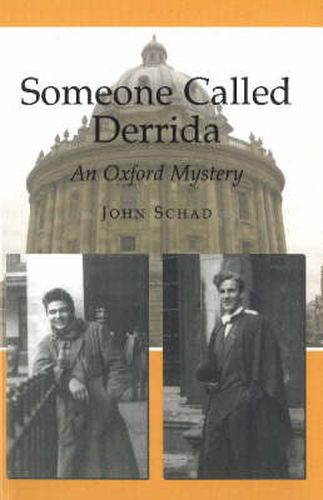Readings Newsletter
Become a Readings Member to make your shopping experience even easier.
Sign in or sign up for free!
You’re not far away from qualifying for FREE standard shipping within Australia
You’ve qualified for FREE standard shipping within Australia
The cart is loading…






‘Autobiography’ may be the least inadequate name for deconstruction but it is not the least complex since, for Derrida, all confession is what he calls ‘circumfession’ – a telling of one’s life that works circuitously, via a detour around the life of another. This book seeks, therefore, to plot or narrate the life of Derrida through or around the lives of others. Some are likely, continental others such as Paul de Man and Paul Celan; some, though, are wholly unlikely, English others whom Derrida never even knew such as C. S. Lewis, Hugh Trevor Roper and, above all, the author’s deceased father Richard Schad, a man who was neither famous nor eminent, simply a kind of Everyman, or Everybody. To quote Robert Smith, ‘how much of [deconstruction] is – 'everybody’s autobiography.’ This is a phrase that Derrida borrows from Gertrude Stein and that echoes, of course, James Joyce’s famous declaration, ‘Here Comes Everybody.’ In tracing these comings and goings, Schad considers to what extent deconstruction may best be called ‘the biography of the other’, or what Derrida himself playfully calls an ‘autobiothanatoheterograpical opus’, a body of writing through which others somehow ghost-write their own lives and, indeed, deaths – this is not just autobiography but autothanatography. As Derrida writes in ‘Envois’: ‘I am dead of a death that is no longer my own’; ‘I truly believe I am singing someone who is dead and that I did not know.’ This, then, is not just another book on Derrida. Instead, it mixes literary criticism and archival scholarship with (auto)biography, investigative history, detective fiction and, indeed, Oxford. Forming as it does one continuous narrative, Derrida via Oxford may be closer in style to a novel than a conventional academic study. The outcome is quite startling.
$9.00 standard shipping within Australia
FREE standard shipping within Australia for orders over $100.00
Express & International shipping calculated at checkout
‘Autobiography’ may be the least inadequate name for deconstruction but it is not the least complex since, for Derrida, all confession is what he calls ‘circumfession’ – a telling of one’s life that works circuitously, via a detour around the life of another. This book seeks, therefore, to plot or narrate the life of Derrida through or around the lives of others. Some are likely, continental others such as Paul de Man and Paul Celan; some, though, are wholly unlikely, English others whom Derrida never even knew such as C. S. Lewis, Hugh Trevor Roper and, above all, the author’s deceased father Richard Schad, a man who was neither famous nor eminent, simply a kind of Everyman, or Everybody. To quote Robert Smith, ‘how much of [deconstruction] is – 'everybody’s autobiography.’ This is a phrase that Derrida borrows from Gertrude Stein and that echoes, of course, James Joyce’s famous declaration, ‘Here Comes Everybody.’ In tracing these comings and goings, Schad considers to what extent deconstruction may best be called ‘the biography of the other’, or what Derrida himself playfully calls an ‘autobiothanatoheterograpical opus’, a body of writing through which others somehow ghost-write their own lives and, indeed, deaths – this is not just autobiography but autothanatography. As Derrida writes in ‘Envois’: ‘I am dead of a death that is no longer my own’; ‘I truly believe I am singing someone who is dead and that I did not know.’ This, then, is not just another book on Derrida. Instead, it mixes literary criticism and archival scholarship with (auto)biography, investigative history, detective fiction and, indeed, Oxford. Forming as it does one continuous narrative, Derrida via Oxford may be closer in style to a novel than a conventional academic study. The outcome is quite startling.